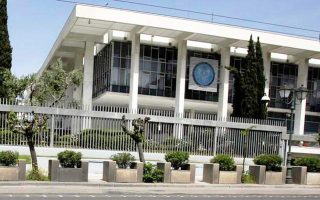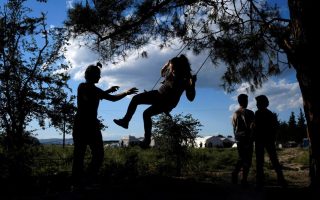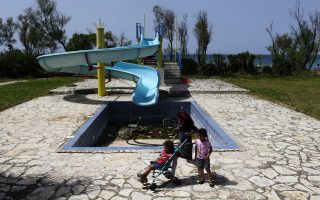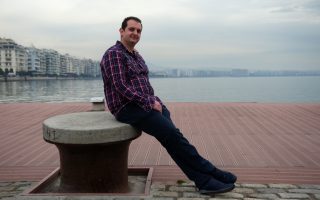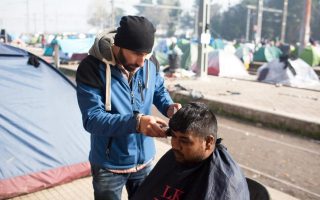Civil society, local government show eagerness to help with refugees

Neo-Nazis marching through the streets of Sweden, the far-right making its political presence felt in Austria, a beefed-up military and police presence on borders in many parts of Europe and stinging criticism on moral and legal grounds of the “one in, one out” agreement with Turkey from human rights groups – these are just some of the signs of the European Union’s existential crisis.
The catalyst for this quandary over the EU’s raison d’etre has been the arrival of hundreds of thousands of refugees on Europe’s shores since last year. Europe’s response has often seemed slow, selfish and driven by fear. Backs have been turned, fingers have been pointed and border fences have gone up. This has not resembled the progressive, open and self-confident EU that many policymakers thought they had been constructing over the last decades.
Looking for the heart of the EU amid the negativity generated by this massive movement of people from war-torn countries to an affluent, stable continent can be a thankless task. But, for those who still want to appreciate Europe’s potential, it can be a rewarding effort.
An international forum held in Barcelona earlier this month provided representatives of civil society and local government a chance to tell their uplifting stories of efforts, sometimes on a small scale, others on a larger one, to receive and integrate refugees into their communities.
Organized by the Public Diplomacy Council of Catalonia (Diplocat), the one-day event saw a series of experts, officials and activists give their accounts of schemes and initiatives to care for new arrivals and, in the process, cast a much more favorable light on Europe.
Practical assistance
Among them were the IFA (Institut fur Auslandsbeziehungen) in Germany using culture as a bridge between refugees and locals, the Punt de Referencia association in Catalonia, which pairs young refugees with locals of a similar age who are willing to act as their mentors for six months, the Danish Center for Gender, Equality and Diversity, which runs similar programs for female refugees, and the Solidarity 4 All group in Greece that worked with six municipalities in Athens to run awareness campaigns in schools, encouraging pupils to collect donations for refugees and allowing refugee children to visit the schools.
The list could go on but these are some examples of the hard and methodical work that is being done behind the scenes to bolster Europe’s humanism and provide practical help to people who are in such desperate need of it.
“We have to be thankful to the 1.5 million people [who reached Europe since last year] because they showed us the limitations of our society,” said one of the forum’s speakers, Kilian Kleinschmidt, a humanitarian expert who has run a refugee camp in Jordan. “They demonstrated that civil society [in Europe] is strong. It is the people that have largely been responsible for dealing with the burden, not institutions.”
Another participant, Chilean psychiatrist Jorge Barudy, speaks of a “tribe of people who base their actions on generosity and solidarity.” Barudy, who came to Barcelona in the 1970s as a political exile from his homeland, provides psychological support to refugees through the Asil.cat network. To highlight the often unseen mental impact of refugees’ traumatic experiences, he takes a sheet of A4 paper and scrunches it up in his fist. The crumpled ball represents the refugee’s state of mind. The task is to restore calm, he says, while caringly smoothing out the piece of paper.
“We should stop talking about member-states and start talking about society,” says IFA secretary general Ronald Gratz, highlighting the ability of civil society to be much more flexible and responsive than central governments, which face bureaucratic hurdles and are often hampered by political concerns.
“Many small people in small places doing small things can change the world,” says Cadiz Mayor Jose Maria Gonzalez, quoting the late Uruguayan writer Eduardo Galeano.
Whether it is the rocky shores of Lesvos, the muddy fields of Idomeni, the arid expanse of Lampedusa or the daunting streets of Northern or Central European cities, “small people” have been helping to make a world of difference to the shattered lives of thousands.
However, as Gonzalez knows, there is a layer of power between civil society and central governments that has yet to fulfill its potential in dealing with the refugee crisis. The other prevalent theme of the Barcelona forum was the frustration felt by local authorities – regions and municipalities – which believe they are well positioned to assist in the reception and integration of refugees but are so far largely being shut out of the process due to decisions at the EU and national level.
Local complications
The president of Catalonia, Carles Puigdemont, says his region is prepared to take in 4,500 refugees and 1,800 of those immediately but is prevented from doing so by the Spanish government. “We want to contribute to a more united Europe,” he says, while blaming divisions in his own country and the central administration’s reluctance to accept refugees for stopping Catalonia from doing its bit.
Barcelona Mayor Ada Colau is also scathing about Madrid’s stance on the refugee issue, labeling “shameful” the fact that Spain has only taken in 18 Syrians so far. They arrived at the end of 2015, a few months after Spain agreed to accept some 15,000 as part of the EU relocation scheme. “We have an obligation to do more if we want to call ourselves democratic institutions that respect human rights,” she says. “We have to do more if we want to look ourselves in the mirror.”
In March, Colau met with Athens Mayor Giorgos Kaminis in Barcelona and offered for the Spanish municipality to take in 100 refugees from the Greek capital to mark the start of a collaboration program. “We want the state, which has the competences and the European funds, to make the most of us,” she said at the time, highlighting the fact that more than six months after launching a scheme to accept refugees, Barcelona finds itself kicking its heels. It has housing, social workers, language courses, mentorship programs and funding, but no refugees.
On Sunday, Spanish Interior Minister Jorge Fernandez Diaz said a first group of 87 refugees from Greece would arrive in Spain between May 24 and 26 and 63 more would arrive at the beginning of June.
While Colau’s and Puigdemont’s comments also reflect the tense relationship between Catalonia and Madrid as a result of the independence debate, officials representing local authorities in other countries also expressed concern about their willingness to help being shunned.
Mateusz Klinowski, the mayor of the town of Wadowice in southern Poland, recounts how he was the first local government official to offer to take in some of his country’s share of refugees under the EU relocation scheme. Being the birthplace of Pope John Paul II, Klinowski said he felt that it was apt for the legacy of Wadowice’s most famous son that the city should host refugees.
Poland’s government in Warsaw, though, had other ideas and made it clear it had no intention of living up to its relocation quota. Klinowski said he was bombarded by a “wave of hatred” that included comments about sending refugees to nearby Auschwitz. Rather than helping refugees build a new life, Klinowski now finds himself being investigated by a prosecutor for comments he made in response to his critics.
Call for change
Attica Governor Rena Dourou was another participant who lamented the restrictions stopping local governments from being able to act on their own initiative and independently of national administrations. “We are stuck in the EU of member-states,” she said.
The Greek official described how the Region of Attica has created a logistics center “for the management, storage and supply of relief items for the refugees.” She said that this was the first of its type in Greece. But the governor insisted that her region, where some 15,000 refugees are currently registered, and other local authorities in the EU can do much more.
Dourou called for a more coherent and consistent asylum system, a clearer legal framework governing the actions of local authorities and for municipalities and regions to be given direct access to EU funds so they can run schemes to receive and integrate refugees.
At the moment, local authorities can apply for EU funding through the Asylum, Migration and Integration Fund (AMIF) but there are several problems with the process. Firstly, the funds available are rather limited (3.1 billion euros for the 2014-20 period), given that nongovernmental organizations and others can also apply for a share. Officials add that other obstacles include the lengthy process that is needed to apply and then draw funds from AMIF, as well as the fact that local authorities have to provide 20 percent of the money for any scheme funded by AMIF cash.
Dourou, along with Rosario Crocetta, head of the Sicily region and Nicola Zingaretti, who leads the Lazio region, sent a joint letter to the European Council, the European Commission and the European Parliament this week calling for the EU’s regions to be “part of a common European integrated solution to the refugee crisis.”
Among the proposals made are that regions should have direct access to the financial resources made available by the EU directorates, be able to tap the Emergency Assistance instrument (700 million euros over three years) created to help with the humanitarian problems caused by the refugee crisis and allow the redirection of European solidarity program funds that were not spent in the 2007-13 period.
The regional heads also call for the creation of a legal framework that would allow regions to deal with so-called “specific groups,” including unaccompanied minors, single women with children and people with disabilities.
“Our regions will continue rescuing, receiving and caring for tormented people, as they have been doing until now, showing great determination in addressing this unprecedented situation despite having inadequate means,” the three officials wrote.
“However, this fight cannot be fought by our regions alone. For this is a fight encompassing not a single region, country, or institution. It encompasses the fundamental EU ideals and the future of the common European project which today is impaired, especially in the eyes of young people.”
Bridging the gap between the willingness and ability to act may be where Europe can regain some of its moral standing. It certainly cannot feel that so many of its ordinary citizens doing extraordinary things to support newcomers is enough. In fact, these selfless Europeans have set the bar high and are challenging their politicians to make the leap.
“The refugee crisis is a great opportunity for Europe to be true to its foundation principles,” says Colau, highlighting the work of volunteers in Greece who have been helping refugees. “We have to live up to these people’s expectations.”
The good news for the EU is that the search for its heart prompted by the refugee crisis has led to a pulse being located. The challenge now is to ensure the rest of the body is working properly.
